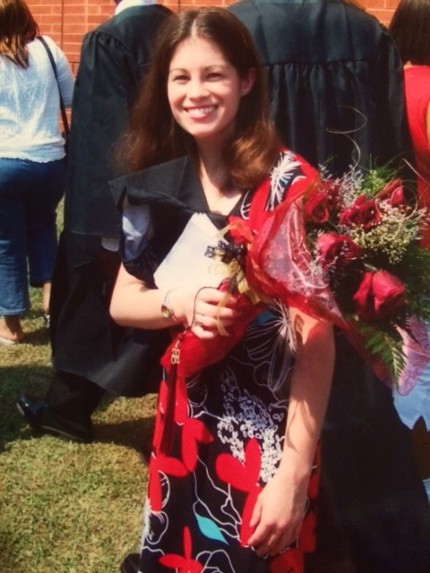
Starting October 28, it’s officially the College Foundation of North Carolina’s (CFNC) College Application Month, which makes me think back to what a simultaneously exciting and terrifying time applying for college, and making what felt like super-extra-final life decisions was for me — even though they ended up not being final at all. What advice would I give myself now, looking back on that time? What advice would I give to the hundreds of students who apply for our scholarships at Triangle Community Foundation each year, many of whom I’ll end up working with as they go to and through college?
Be honest with yourself.
When I graduated high school, I was convinced I was going to be pre-med in college and become a doctor. Before I even got to orientation at UNC, I had admitted to myself that maybe not even liking science would be an impediment to a career in medicine. My college application essay was about my experience as an 18th-century dancer and my love of chamber music, which was probably a giveaway to admissions officers that I’d end up choosing a different path (also that I was definitely very cool in high school. Definitely). It’s ok not to know what you want to do with your life, or what you want to major in, or where you’ll end up in 4, or 10, or 25 years. Enjoy this time dedicated to figuring that out, and take advantage of the people who can help you do that — family, guidance counselors, career counselors, peers, mentors, and teachers.
Seek out new experiences.
I majored in English and minored in Women’s Studies, focusing on 19th century British literature and women’s social history (that whole “very cool” aspect of my life carried over to college, clearly). I loved it — but it was the experiences I had outside of class that informed who I became and the path I took even more than the many, many times I had to read Tess of the D’Urbervilles. Being a student leader of Best Buddies and the Campus Y, volunteering weekly at the Inter-Faith Council for Social Service’s Community Kitchen, and graduating as a Public Service Scholar helped me make the decision to pursue a Master’s in Social Work and to continue volunteering actively. Those experiences also helped me adjust to a campus that had more students than my hometown had people, and I’m grateful to all the relationships I formed with students and community members both similar and different to myself.
Know your options, but keep them open.
When you’re making your college decision, spend some time doing your research. Learn the difference between a community college, a public college or university, and a private college or university. Which one is right for you? (No wrong answers here — remember that “being honest with yourself” part). Things to consider are your career goals, if you know them; what majors, clubs, or internship opportunities that each offers that sound interesting to you; and, of course, what you can afford. Apply for different types of schools and evaluate your options considering all of these pieces. Sometimes the “sticker price” (full cost) of a college makes it feel impossible, but you may be offered financial aid that makes it possible, or might make it possible if you transferred after receiving your associate’s. If your first choice doesn’t work out, don’t despair — UNC was my last choice (don’t tell them I said that) but I wouldn’t change a bit of it. I didn’t know about all of the opportunities I would have there and the many ways it would change my life’s trajectory for the better.
Ask questions, and ask for help.
I can’t emphasize this enough. This process is CONFUSING! It’s ok not to understand some of the terms, especially about financial aid. Ask questions, even if the question is “Who can help me understand this?” or “What resources can I access to help me learn?”. It’s easy to get frustrated or upset — but many people will be willing to take the time to help you if you ask in a genuine way. Reach out to your high school’s guidance counselors, or the admission and financial aid staff at the colleges you’re applying to or where you’ve been accepted. If you have questions about student life, ask if you can speak with a current student. If you have questions about what a particular job or career path is like, ask the college’s career office could connect you with one of their alumni in that field to have a short conversation (there is plenty of time for this once you get to campus, too!). If you need help with your essay, ask a family member and/or friend to read it for you and give you feedback. Does it convey who you are as a person, and what you’re passionate about?
And finally — things can change. I might even venture to say that things will change. I thought I wanted to go a private college, major in biology, and do research in a lab. Instead, I went to a public university, majored in English, and spent most of my time doing community service. Enjoy the journey you’re about to take — I can’t wait to hear about where it leads.
In 2017, Triangle Community Foundation awarded nearly $1 million in scholarships and awards to North Carolina students. More information on 2018 applications and deadlines is available here.
Contributing writer Sarah Battersby is the Foundation’s Scholarships & Donor Services Officer.
